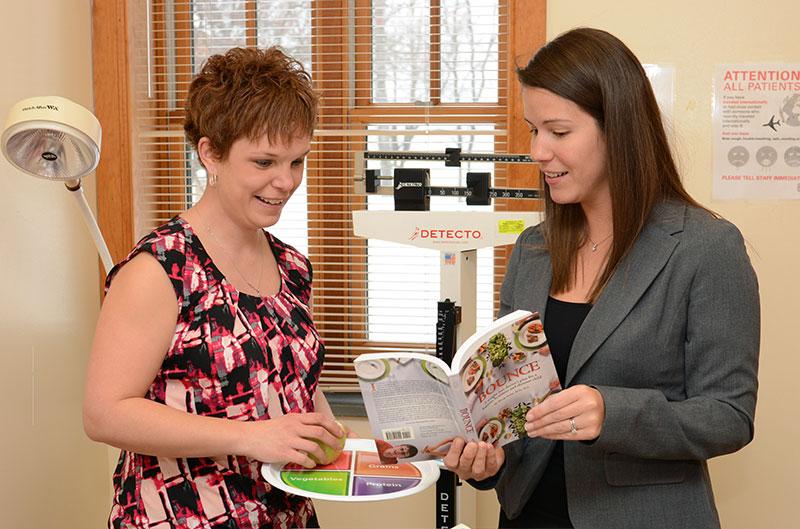Targeting obesity—Amy Bidwell (left) and Elizabeth Keida of SUNY Oswego’s health promotion and wellness faculty meet in Mary Walker Health Center to talk about a program to help obese children in Oswego County and in northeast Brazil learn about nutrition, exercise and behavioral triggers for unhealthy eating. Thanks to earning a highly competitive grant from 100,000 Strong in the Americas, Oswego and SUNY Ulster, along with a Brazilian university, will recruit college students to help implement the 16-week program in both nations.
SUNY Oswego recently earned a highly competitive grant from 100,000 Strong in the Americas to train students here and in Brazil to implement a health-and-wellness program to fight childhood obesity in both countries.
Teaming with a Fayetteville doctor and SUNY Ulster and its nursing program, SUNY Oswego’s health promotion and wellness faculty and students soon will begin a study-abroad exchange with Brazil’s Faculdades Integradas de Patos.
In the latest round of grants from 100,000 Strong—President Barack Obama’s signature education initiative for the Western Hemisphere—the proposal put together by SUNY Oswego, “Promoting Study Abroad Focusing on Health and Nutrition,” was one of only seven recipients nationally. The Coca-Cola Foundation supported the Innovation Fund grants.
Amy Bidwell of Oswego’s health promotion and wellness faculty partnered with Cleane Medeiros of biological sciences and Kimberly Armani, director of the SUNY Oswego Metro Center in Syracuse and its Active Aging and Community Engagement Center, to put the program together.
The $25,000 grant will help bring Brazilian scholar Wendell Soares Carneiro to Oswego and SUNY Ulster in March for six months, bring eight Brazilian students here in May and send eight Oswego and Ulster students, as well as Elizabeth Keida of the health promotion and wellness faculty, to the partner college in Brazil’s state of Paraiba.
The student-and-faculty team will help implement in both countries a wellness program developed by Fayetteville weight-loss physician Wendy Scinta, who wrote the book “BOUNCE: A Weight-Loss Doctor’s Plan for a Happier, Healthier and Slimmer Child.”
Reversing obesity
The grant’s implementation of the program will focus on behavioral elements that trigger unhealthy eating, as well as on nutrition and exercise, for obese children ages 11 to 12, Bidwell said.
“We are planning recruitment and intervention in Oswego County through physicians’ offices,” Bidwell said. “The (college) students are going to learn this program and learn how to go into the community to promote and start it up.”
Scinta is developing online modules for the 16-week weight-loss program, Bidwell said. The SUNY Oswego students accepted to assist with starting up the program are in for a clinically rich internship and study-abroad experience.
“Obesity is a stronger predictor of increased disease and morbidity than smoking,” Bidwell said. “We will be teaching children how decisions they make today will affect them two to five years and more down the road.”
Childhood obesity affects 17 percent of children and adolescents in the United States, triple the rate from just one generation ago, according to the Centers for Disease Control. A 2013 study in the International Journal of Obesity Supplements reported obesity escalating sharply in Brazil among all children’s age groups.
Bidwell said a research study—looking at such factors as parents, grandparents, early education and socioeconomic status—would be part of the program.
“I have specifically studied obesity in college-age people, focusing on physical activity,” she said. “This brings me into a younger population.”
Besides encouraging health and nutrition, SUNY Oswego had a variety of goals in applying for the 100,000 Strong grant: partnering with the Brazilian university as a long-term vehicle for study-abroad exchange, enhancing students’ global cultural awareness and opening up a new opportunity for beneficial community engagement.
Oswego already has developed rich relationships with a number of federal universities in Brazil —including undergraduate research opportunities through Oswego’s Global Laboratory—though the “Promoting Study Abroad Focusing on Health and Nutrition” program would be the first with Faculdades Integradas de Patos, Bidwell said.




